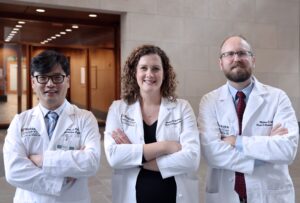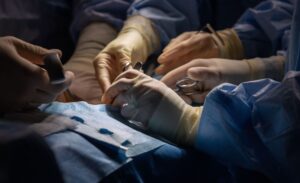Didactics
Residency is more than just operative skills. This program offers a variety of didactic sessions. Plastic and Reconstructive Surgery residents receive service specific, multidisciplinary and department-wide conferences at standardized times throughout the week.
Conferences are typically held in the morning before operative cases. Our current conference schedule includes all topics required by the Association of Academic Chairmen of Plastic Surgery Curriculum Guide. This is a 2-3 year curriculum. We also incorporate the innovative curriculum from ASPS (EdNet).
Grand Rounds
(every Wednesday)
Medical professionals from our own division and other related specialties discuss topics related to the practice of plastic surgery.
Core Curriculum
(every Wednesday)
Core Curriculum is led by a resident discussant and a selected faculty member, who is an expert on the weekly topic. The ASPS Residency EdNet modules and the ACAPS CoreQuest curriculum are reviewed in these sessions. This is currently a 2-3-year curriculum. We also have “unknown sessions” with faculty presenting oral board style questions.
Morbidity & Mortality Conference
(every 4-6 weeks per year during Grand Rounds)
The division conducts a traditional Morbidity & Mortality Conference reviewing critical cases. We also incorporate cases of high educational interest.
Trauma Conference
Faculty and residents present cases from preceding weeks and discuss initial management of the injury, review radiologic findings, and discuss operative management and ongoing patient care challenges for each case.
Journal Club
(monthly)
An assigned resident and faculty member choose journal articles from Plastic and Reconstructive Surgery and other monthly journals. All residents are encouraged to attend this conference. Residents will review the papers and critically analyze its structure and scientific merit. These journal clubs are often sponsored by the department or medical representative and are held outside the hospital.
Hand Conference
(every Monday)
Faculty, residents and hand fellows discuss specific topics assigned by the American Board of Plastic Surgery or specific cases encountered in the Emergency Department, clinic or operating room.
Nerve Conference
(every Wednesday)
Faculty, residents and nerve fellows discuss cases or learn from lectures by experts in the field.
Cleft/Craniofacial Conference
(every Friday)
This is a multidisciplinary conference for residents on the St. Louis Children’s Hospital rotation. This is an interactive teaching conference by a faculty member followed by a comprehensive review of patients seen in our multidisciplinary team clinic. Residents will be exposed to all aspects of cleft and craniofacial care including surgical management, psychology, speech pathology, audiology, and pediatric orthodontics and dentistry.
Special Lectures
(two to three times per year)
The division hosts a visiting professor who is a leader and expert in their field. The professor spends an afternoon and the following morning giving lectures, moderating discussions and reviewing challenging cases with the residents and faculty.
Cadaver Labs
Faculty arrange a number of educational opportunities at the Washington University Institute for Surgical Education (WISE) or other local anatomy and surgical education centers. These are led by a faculty member and include training on plating techniques, operative approaches and detailed dissections of pertinent anatomy.
Microsurgical Training
Faculty members accompany residents individually to the laboratory where they are given an introductory course in microsurgery technique. The laboratory, which includes a state-of-the-art operating microscope, microsurgical instruments, suture and simulated vein material as well as blood vessels from laboratory rats, is available for resident use. This is housed right in the resident office to allow for ample time for practice.
Nerve Surgery Training
Peripheral nerve surgery is complex from both the diagnostic and management perspectives. Because it is a young field with new techniques constantly in development, few surgeons are exposed to the full range of nerve surgery techniques during training. The Peripheral Nerve Surgery website was developed to review established practices and to provide detailed information about many of the newer ideas and techniques now being used. The residents reference this site very frequently in training.
Filler/Botox Clinic
(twice a year)
Residents are given the opportunity to evaluate patients for non-surgical facial rejuvenation, discuss the plan with attending physicians, and implement this plan on volunteer patients. Supplies are provided by company representatives. This provides a protected setting in which to learn and use these techniques for residents of all levels.
Mock Oral Boards
(twice a year)
Residents in years 4-6 participate in a mock oral board session with faculty. It very closely replicates the oral board experience, and residents have found it very useful
James Barrett Brown Research Day
PGY2-6 residents are required, PGY1 residents are encouraged, to present their research findings related to a project on which they have worked throughout the year at the exciting James Barrett Brown Research Day event, celebrated with our graduation festivities. We invite a James Barrett Brown Visiting Professor each year to join our festivities and to provide an inspiring lecture.
Plastic Surgery Research Seminars
(4th Wednesday of each month)
Residents are encouraged, but not required, to participate in a monthly seminar series hosted by our division. These seminars showcase our entire division’s innovative basic, translational and clinical portfolio. The seminars given by our faculty cover a wide-range of topics pertinent to Plastic Surgery from animal models to systematic reviews, from cutting-edge surgical devices to entrepreneurship and are an excellent way to stay abreast of the diverse research activities within our division.
Please email Dr. Matthew Wood (woodmd@wustl.edu) or Gary Skolnick (gskolnic@wustl.edu) for the Zoom link.


